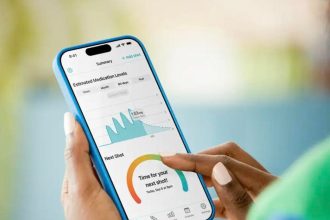InnovationRx is your weekly digest of healthcare news. To get it in your inbox, subscribe here.
It’s no surprise that total venture funding for New York-based digital health startups was down in 2023. The latest Digital Health New York report released this week found 114 companies raised $2.5 billion last year, which is on par with 2019 – but significantly down from the all-time high of $9 billion in 2021. But DHNY’s cofounder and CEO Bunny Ellerin told Forbes she was surprised by the digital health community’s outlook for the year ahead. “The group seems quite resilient,” she said. “And they’re more optimistic about `24 than they were about `23.”
Only 39 percent of the 100 founders, investors, payers and providers surveyed said they were concerned about the economic environment negatively impacting business in 2024, compared to nearly half of the group who said they were concerned in 2023. A whopping 28 percent of people surveyed said they were not concerned at all, compared to 9 percent in 2022. The top three challenges in the year ahead were sales and business development, funding and hiring.
Another trend that tracks with the overall venture market is a shift towards more funding for early stage companies. In 2023, 55 percent of funding went to earlier stage companies compared to 39 percent in 2022. And when will the market for late-stage funding rebound? It’s nearly a tie between the second half of 2024 versus 2025, according to the people surveyed.
Here’s what to watch: “There’s a lot of AI interest, but there’s also more specialty care plays,” said Ellerin, including obesity, cardiovascular and oncology. She also listed mental health, especially for teens and kids, as well as women’s health. Forty-five percent of people surveyed said adopting generative AI will be the biggest “leap forward” in healthcare in 2024. But the big focus will be on reducing administrative burden. “Healthcare is hard,” said Ellerin, “And incremental changes are important.”
Amazon Pharmacy Layoffs: Company Cutting Hundreds Of Health Division Staff In Latest Round Of Job Losses
Amazon Health Services is cutting “a few hundred” employees from its One Medical chain and Amazon Pharmacy, the company announced Tuesday, marking the latest round of job cuts after a brutal 2023 for one of the nation’s largest private employers.
Read more here.
Pipeline & Deal Updates
Ambient AI: Ambience Healthcare raised a $70 million Series B round co-led by Kleiner Perkins and OpenAI Startup Fund for its software that includes an AI medical scribe, coding and referral solutions.
RSV Vaccine: GSK announced that the FDA has accepted its application for priority review of its RSV vaccine for adults aged 50-59.
Endoscopy Alternative: The FDA has cleared Cyted’s EndoSign device, which collects esophageal samples without the need for a full endoscopy.
Oncology: Novartis has signed an agreement to acquire German-based oncology pharmaceutical company MorphoSys in a deal worth about $2.9 billion.
Bone Cancers: Bridgebio has granted an exclusive license to Kyowa Kirin to market its skeletal dysplasia treatment infigratinib in Japan. The deal includes an upfront payment of $100 million to BridgeBio as well as over 20% royalties on sales.
What To Know About Skin Color Bias In Pulse Oximeters As FDA Discusses Potential Changes
A Food and Drug Administration advisory committee recently met to figure out ways to make pulse oximeters more accurate when doing readings on darker skin both in hospitals and at home, after research showed wrong readings led to treatment delays, particularly among Black patients.
Read more here.
Other Healthcare News
CVS Health reported net income of $2 billion due to a big increase in Obamacare enrollment. Health insurer Centene reported $45 million in fourth quarter profits.
Rite Aid completed the sale of its Elixir pharmacy benefit management company MedImpact Healthcare Systems for $576.5 million.
Eli Lilly shares jumped this week after the company reported better-than-expected fourth quarter results as it rolls out weight loss drug Zepbound. Meanwhile, Danish drugmaker Novo Nordisk said it will boost U.S. supplies of Wegovy, which could help mitigate shortages.
A study released this week suggested Mounjaro and Zepbound might significantly reduce blood pressure.
Across Forbes
How Generative AI Helped Make AMD’s Lisa Su A Billionaire
The U.S. Banned Xinjiang Tomatoes Over Forced Labor Fears. Amazon And Walmart Still Sell Them
Did You Use ChatGPT On Your School Applications? These Words May Tip Off Admissions
What Else We are Reading
Lawmakers introduce bill to fix the Inflation Reduction Act’s ‘small-molecule penalty’ (Chemical & Engineering News)
Aduhelm was a mess — and it could happen again (STAT)
Halfway Through ‘Unwinding,’ Medicaid Enrollment Is Down About 10 Million (KFF Health News)
Read the full article here





